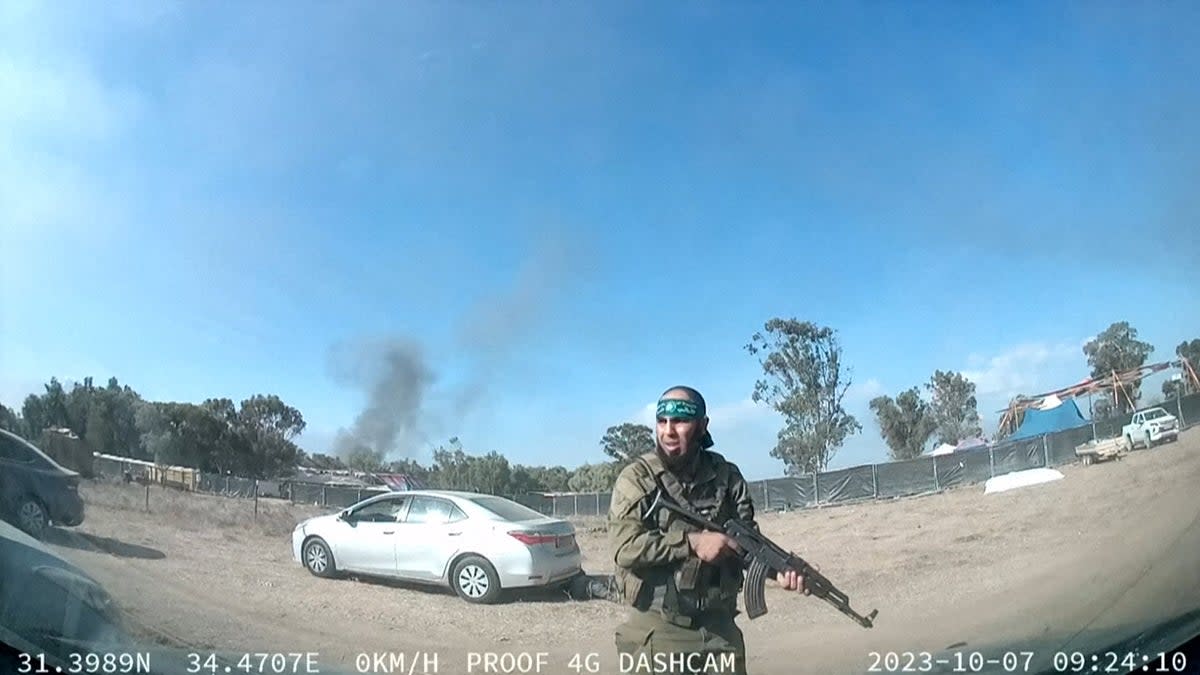War crimes committed in 7 October attack by Hamas ‘designed’ to kill civilians, rights group says

The Hamas-led attack inside Israel on 7 October was “designed” and “planned” to kill civilians and take as many people hostage as possible, a leading human rights group has said.
In a 236-page report, Human Rights Watch (HRW) concludes that Palestinian armed factions committed war crimes and crimes against humanity including murder, sexual violence, mutilation of bodies, and use of human shields.
The global rights group says its teams interviewed almost 150 witnesses, first responders and family members for the research and verified more than 280 photos and videos for the investigation.
They described fighters shooting directly at civilians as they tried to flee, firing rocket-propelled grenades at homes, setting fire to buildings with people inside, and mutilating and robbing corpses.
HRW concluded that killing civilians and taking hostages were the “central aims” of the planned attack “not an afterthought, a plan gone awry or isolated acts”. Hamas has denied its fighters committed any violations of international law and blamed the bloodshed on “chaos in the field”.
“Human Rights Watch research found that the Hamas-led assault on 7 October was designed to kill civilians and take as many people as possible hostage,” said Ida Sawyer, HRW’s crisis and conflict director. “The 7 October atrocities should spur a global call to action for an end to all abuses against civilians in Israel and Palestine.”
HRW noted that its previous reports have addressed numerous war crimes committed by Israeli forces in Gaza since the attacks, including apparent illegal strikes and using starvation as a weapon of war.
HRW called on all parties to the conflict to abide by international law and urged governments with influence over the Palestinian armed factions to press for the urgent release of the hostages – an ongoing war crime – and for those responsible to be brought to justice.
It called on Hamas, which controls the besieged Gaza Strip, to immediately release the hostages and cease unlawful attacks including indiscriminate rocket attacks against Israel. It also urged the Palestinian Authorities – anchored in the occupied West Bank – to conduct transparent and impartial investigations into the allegations in the report.
“Atrocities do not justify atrocities,” Ms Sawyer added. “To stop the endless cycle of abuses in Israel and Palestine, it’s critical to address root causes and hold violators of grave crimes to account. That’s in the interests of both Palestinians and Israelis.”
Hamas militants and at least four affiliated armed factions as well as citizens from Gaza stormed southern Israel on 7 October, killing around 1,200 people and taking more than 250 hostage, HRW said. More than 100 hostages remain within Gaza.
Since then, Palestinian health officials report Israel’s ferocious bombardment of Gaza has killed more than 38,000 people, the vast majority women and children. Thousands of bodies remain under the rubble and a crippling Israeli siege on the 42km strip has assisted in sparking a famine, rights groups have told The Independent.
For its latest report, HRW interviewed 144 people including 94 Israelis and other nationals who witnessed the 7 October assault, as well as victims’ family members, first responders, and medical experts. Researchers also verified and analysed more than 280 photographs and videos taken during the assault and posted on social media or shared directly with the group.
It concluded armed groups committed numerous violations of the laws of war that amount to war crimes, including attacks targeting civilians and civilian objects, willful killing of people in custody, cruel and other inhumane treatment, crimes involving sexual and gender-based violence, mutilation and despoiling bodies, use of human shields, and pillage and looting.
It also concluded the “widespread attack” was directed against a civilian population, and that killing civilians and taking hostages were “central aims of the planned attack”.
In response to the report, Hamas, which is designated a terrorist organisation in countries including the US and the UK, said that its forces were instructed not to target civilians and to abide by international human rights and humanitarian law. The militants blamed the attacks on civilians on “chaos in the field”, saying people from Gaza and non-affiliated Palestinian groups rushed into Israel once Israeli forces were overwhelmed.
Hamas rejected what it called “the lies and blatant bias” towards Israel and demanded Human Rights Watch withdraw its report and apologise.
In many cases, HRW said its investigations found evidence to the contrary of the claims by Hamas. The extensive report includes harrowing testimonies.
Simcha L, a member of the rapid response team in the Mefalsim kibbutz where at least 10 civilians were killed, told HRW that the scene was like an “apocalyptic zombie movie”.
“You could see bodies. … Lying around in ditches, bodies burning in cars. There were bullet holes all over the cars. To the right of the gate were dozens of bodies,” he said.
Lior Alush, a 24-year-old student who managed to escape a bloody attack on Zikim Beach where 19 people were killed, described the scene: “All the way home, I saw dead bodies along the way. I feel like I’m doing a driving test but navigating through bodies.”

